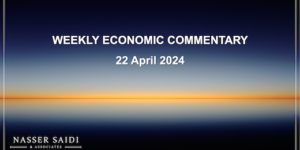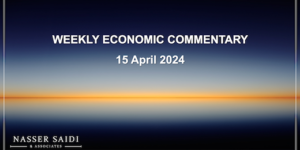Markets
The developed economies stock markets suffered a painful week, erasing the gains achieved in the first three weeks of June due to renewed tensions on euroarea sovereign debt. Emerging markets were less affected, but the yuan revaluation is still being digested, with ensuing reduction in global liquidity rightly perceived as a negative for stocks. Regional markets were mixed with Egypt suffering the most from contagion. The euro was broadly stable versus the dollar, but dropped against the yen. Oil and gold were broadly stable.
Global Developments
Americas:
- US new home sales declined 32.7% in May to an annual rate of 300,000 units, an all time low and well below market consensus. Housing Price Index showed US home prices rising 0.8% mom in April compared to a revised 0.1% mom in March, probably reflecting a surge in transactions heading into the tax benefit deadline.
- The US Fed after its regular policy meeting vowed to hold the rates unchanged for an “extended period”, stressing preoccupations for a slow US economic recovery.
- New orders for durable goods fall -1.1% mom (+15.3% yoy) in May, while orders for nondefense capital goods ex aircraft rose in line with expectations. Initial and continuing claims fall as anticipated.
- Initial jobless claims fell by 19k to 457k in the week ended June 19. Continuing claims fell by 45k during the week ended June 12, from an upward-revised level in the previous week.
- US GDP was revised to 2.7% qoq annualized from a previous 3.0% due to revisions in services consumption.
Europe:
- The U.K. government presented its austerity budget, with planks broadly in line with expectations. The budget lays out a 5-year plan, aiming to reduce the deficit from 11% of GDP in 2009-10 to 2.1% of GDP in 2014-15.
- The UK has imposed a tax on banks amounting to GBP 2 bn. Other EU countries are expected to follow soon.
- Germany’s IFO for June exceeded expectations thanks to the current conditions component up by 7 points, to 101.7, even thought the expectations component faded. GDP growth in Q2 therefore could be stronger.
- Polish Presidential Elections confirmed that Komorowski, the acting president and candidate of the governing PO, won the first round with 41.2%. He will fight on July 4th Kaczynski, leader of the opposition.
- The EU April current account dropped unexpectedly to a €-5.1 bn deficit after a €1.5 bn surplus in March.
- Eurozone PMI manufacturing showed a 55.6 assessment, a minor decline of 0.2 points. Meanwhile, EMU Services PMI decreased significantly to 55.4 from 56.2 last May. German manufacturing PMI indicated that worsened marginally by 0.3 points to 58.1 and the services PMI offered a similar picture, down by 0.2 points.
Asia and Pacific:
- The yuan revaluation has so far produced modest effects but it is a step in the right direction to address the global current account imbalances, stem inflationary pressure in China and reduce liquidity worldwide.
- The Japanese government outlined a 10-year deficit reduction plan still lacking specifics and still in the mire of the political realities especially the outcome of next month’s Upper House election.
- Core CPI in Japan rose above market forecast, narrowing to -1.2% yoy in May (April: -1.5%). The deflationary trend remains intact, excluding the impact from one-off effects and erratic components.
- The Japanese trade surplus was ¥324.2 bn in May from a revised ¥730.0 bn in April, below the expectations.
- Japanese All Industry Activity Index grew 1.8% mom in April, the highest climb in the last 3 months.
- Singapore’s May industrial production increased 5.2% mom in May, after 17.7% in April, the sixth consecutive month of positive growth. The main driver of this jump was a surge in pharmaceutical production.
Bottom line:
This week has brought back the attention on key unresolved issued that markets had preferred to ignore. The dramatic drop of the house starts in the US is a reminder that the real estate crisis might take another nasty turn; Fannie and Freddie will be delisted and their rescue could cost another USD400 bn. The announced stress test of the Spanish banks puts the spotlights on the volume of toxic assets still plaguing European banks. The G20 Meeting focused on financial regulation with a capitulation to the interest of large banks. No consensus view emerged on fiscal policy: the Europeans are broadly in favor of tightening the US prefer to wait and see.
Regional Developments
- Qatar’s Public Works Authority (ASHGHAL) signed a contract, valued 1.59 bn Riyals (USD 437 mn), with Turkish Yuksel Insaat and Qatari Midmac Contracting to build the seventh phase of Doha Highway.
- Oman boosted its crude production by nearly 68,000 barrels per day (+8.6%) in the first four months of 2010 pushing ahead with a drive to reverse a decline in its oilfields production.
- The Lebanese government approved, for the first time since 2005, the 2010 budget, equal to 13.33 bn USD based on relatively low 4.5 % growth, compared with the IMF’s forecast of at least 8%. The deficit is projected at 10% of GDP, up from 9% in 2009 (with public debt at 153% of GDP, i.e. 50 bn USD).
- Kuwaiti Prince Basel Salem Sabah Al Sabah, 52, was allegedly shot by his uncle, Shaikh Faisal Al Jaber.
- Inflation in Kuwait fell 0.3% mom in Feb – food prices (18% of the basket) fell by 0.3% mom (Jan 0.8%); transport prices rose 0.1% (Jan:0.2%).
- According to the World Gold Council, gold held by the Saudi Arabian Monetary Agency more than doubled to 322.9 tonnes from 143 tonnes. SAMA made a cryptic reference in a footnote to its latest quarterly report that “gold data have been modified from Q1 2008 as a result of the adjustment of the Sama’s gold accounts”.
UAE Focus
- Dubai exports and imports grew 14% yoy and 9% in value terms during Jan-Apr 2010 to reach AED 180.7 bn and AED 115.6bn respectively. India accounted for the largest share of the imports (AED 17.1 bn or 14.8% of total imports) while China came close with AED 10.1 bn and US at AED 7.8 bn.
- Real estate transactions registered at the Land Department totalled AED 117 bn in the first five months of 2010. The official records showed 3,462 sale transactions were registered in the period, with a total value of AED 25 billion and a combined area of 62,815 sq ft.
- Dubai airports’ passenger traffic rose 13.6% yoy in May to 3.65 million passengers – the 11th consecutive month of double-digit growth. In the first 5 months of 2010 passengers were 18.9 million, up 17.7% from the same period in 2009. Freight volumes rose 31.7% yoy to 195,221 tons in May, driven by increased activity in Asia and regional markets.
- UAE deposits fell to AED 970.8bn at the end of May, as government deposits dropped by nearly AED 15.9bn to Dh191.3bn. Money supply in the UAE rose 0.4% yoy at the end of May, in the slowest pace of growth since at least 2001, after a 2.1% rise in Apr 2010. Meanwhile, overall bank loans touched AED 1,021.2 bn, and deposits fell to AED 970.8bn.
- UAE’s balance of payment (BoP) deficit narrowed to AED 22.5bn in 2009 (2008: AED 172 bn) after a massive improvement in net capital flow and a decline in imports due to the global economic downturn. Current account remained in a surplus – to AED 28.8bn in 2009 (2008: AED 81.8bn).
- MSCI announced that it will maintain the classification of UAE financial markets as Frontier Markets. MSCI UAE Index will remain under review for a potential reclassification to Emerging Markets in 2011.
- Abu Dhabi based Aabar Investments announced it might delist from the stock market. Aabar also bought a 4.99% stake in Italian bank Unicredit, one of the largest European banks by capitalization.
- Construction company Arabtec confirmed that it has received the first payment of outstanding debt (equal to Dhs 500,000) from Nakheel.
- Dubai’s Emaar Properties has sold the rights to operate Hamptons International in the U.K., Europe and Asia to Countrywide, the U.K.’s largest estate agency and property services group.
- According to the periodic Harbor Report 50,000 new residential units will come in Dubai property market by end 2011. Prospective office tenants are refusing to consider strata titled buildings, with an average estimated reduction in office lease rates of 50% over the last year.
- Rental values in DIFC financial district have not recorded any decline in the past three months. DIFC rents declined only 11.1 % in the past year.





